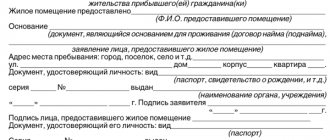The issue of deregistration or deregistration of children under the age of majority from an apartment is not an easy process. It has many nuances due to various situations. You will need some knowledge regarding existing legislation to fully understand how to remove a minor child from the owner’s apartment. The upcoming deregistration process will require compliance with certain formalities, as well as documentary evidence that deregistration of children under the age of majority will not violate their rights.
Reasons for termination of registration for a minor child
The housing rights of children under 18 years of age are protected by Russian legislation and should not be infringed. There is an obligation to register (register) children no later than one month from the date of birth. Registration is carried out in municipal or private housing. Children are removed from registration only when there are certain reasons for this . It could be:
- parental divorce;
- sale of one living space and purchase of another;
- moving to another locality when the family changes its place of residence.
Our editors advise you to familiarize yourself with the features of obtaining an urban planning plan for a land plot.
What laws should you rely on - a chain of articles of law
- After a divorce, family relations with the ex-wife cease, so she automatically becomes the owner of the former family member - paragraph 13 of the Supreme Court Resolution No. 14 of July 2, 2009.↓
- The ex-wife, as a former member of the owner’s family, does not retain the right to reside in the apartment, unless there was another agreement - clause 4 of Art. 31 Housing Code of the Russian Federation.↓
- The owner may demand the elimination of any violations of his rights, although these violations were not related to deprivation of possession - Art. 304 of the Civil Code of the Russian Federation.
The owner must be informed in the lawsuit and in court: 1) The ex-wife has become his former family member, family relations with her have been terminated. 2) There was no agreement between them regarding accommodation. And if there was, then it was terminated. 3) Her registration prevents the owner from fully owning and disposing of the apartment.
Children's rights to living space and registration in an apartment
For a citizen who is a minor, the Constitution of the Russian Federation and the Family Code guarantee him housing.
From these documents it follows that children under 18 years of age can be registered in the apartment where their parents and other legal representatives are registered: guardians, adoptive parents. Thus, they have the rights to own the residential premises (apartment) that belong to them. Representatives determined by the Law register a minor citizen in a non-privatized, private apartment they occupy. This provision, enshrined in Article 20 of the Civil Code of the Russian Federation, is kept under the control of the guardianship and trusteeship authorities. There are cases when the father and mother live and are registered in different places.
Then he is prescribed to one of them. This operation does not require the approval of all persons living in the apartment where the child is to be registered. Before starting to discharge him from the apartment, you need to obtain the consent of his father and mother (one of them), the guardianship authorities must give their permission, otherwise the discharge is accompanied by an appeal to the court, its decision.
Conditions for discharge and legal grounds
If you want to deregister a boy or girl as non-resident, you will have to collect evidence for this. This can only be done in court.
Please note that the child cannot be discharged at the request of the defendant simply “under the fence” (at least according to the letter of the law). If you are considering a new home for him, keep in mind that the conditions there for the little citizen should be no worse than in his previous home (Article 20 of the Civil Code).
Proof that a person does not live in the apartment may be:
- act on non-residence in the apartment (drawn up by the district police officer);
- witness's testimonies;
- pre-trial correspondence.
If parents check out, then for their offspring this automatically means the inability to use the apartment. The son or daughter will be registered at the address where the father or mother is registered (Article 20 of the Civil Code).
Moreover, even if they (or one of them) are deprived of parental status, then for the law this does not mean that the child no longer has the right to their home.
Can the owner remove children from the apartment?
According to Russian laws, the owner, at his own discretion, has the right to dispose of the property belonging to him.
However, the procedure involving the transfer of real estate to another person stipulates that all citizens registered in the apartment must be removed from the registration register. Difficulties may arise in relation to persons registered in this living space who have not reached the age of 18 years. Problems arise when children live in a different living space. So, how to remove a child from the owner’s apartment? The owner of the residential premises is endowed with the corresponding right and can discharge a minor from the living space without obtaining permission from the guardianship service. However, if a fact is established that led to the infringement of the rights of a minor citizen, the court will in all likelihood return to him the right to be registered in the same apartment.
On the eve of the upcoming procedure for the discharge of children under 18 years of age, you should remember the existing nuances:
- All actions related to the registration of a citizen who is under 18 years of age in an apartment are carried out by his parents. They are representatives of his interests under the law.
- For a minor citizen under 14 years of age, only representatives expressing his interests according to the law have the right to sign documents.
- Children whose ages begin at 14 and end at 18 are allowed to handle the paperwork themselves. During this procedure, the presence of legal representatives is mandatory.
- Consent obtained to deregister children is given by two parents (if any).
- If children under the age of majority, registered in an apartment owned by relatives, want to deregister, and the parents are against this, the case is decided by the court. The location where the children are actually located is taken into account.
- Children under 14 years of age can only be deregistered by their father or mother.
- The procedure for removing minors from registration requires confirmation that they are awaiting registration at a different address. In the new living space, the living conditions of the minor should not be inferior to those in the previous living space. Thus, a minor should not move from separate housing to a room with communal conditions and register there.
- There may also be a requirement that the new apartment be located in the same area where the old one was located. This requirement is based on ensuring that children have the opportunity to study in the same school and attend kindergarten as before. When the requirement is not feasible, consent from the guardianship authorities is required.
Where to go to get benefits for a disabled child
Pension Fund. Accepts documents for benefits and determines its amount. To receive a pension, the child's representative must submit an application. You can contact the fund at your place of registration or place of stay. There are only two conditions - the confirmed status of a disabled child and permanent residence in the Russian Federation. The pension is assigned from the first day of the month of application. The pension is assigned for the period during which the person is recognized as disabled.
- Social protection. Accepts documents and sends a request to the accounting department for a discount on housing and communal services. Before contacting social media protection, you need to pay off the debt on utility bills. The center's specialists provide assistance in drawing up an application. The discount is valid for a month. Please note that utility bills must be paid no later than the 26th of the current month.
- Tax Inspectorate. Accepts 3-NDFL declaration for tax deduction. In addition, the tax deduction can be returned through the employer. The difference is that you can submit a return to the tax office only for the past year, and to the employer for the current year.
- District administration. Involved in the distribution of land for construction. To do this, you must submit an application, which is reviewed within thirty days. Land is provided on a first-priority basis without bidding for rent or ownership for a fee. You should also contact the administration for the development of an Individual Rehabilitation Plan.
- FSS. Distributes vouchers to camps and sanatoriums. An application is submitted for this purpose. You also need to have a referral from a doctor if treatment is not included in the IPR. Registration upon application takes place within ten days. The voucher is provided no later than 18 days before the date of arrival. The duration of treatment in the sanatorium is from 21 to 42 days with payment for travel to the place of treatment.
The procedure for discharging a child from the apartment
When it is necessary to remove a minor from registration in the owner’s living space, the following actions should be taken:
- An application is written to the passport office (migration service) on behalf of one or both parents in order to remove the minor from the apartment. The presence of a citizen from the age of 14 is mandatory.
- At the passport office or other similar service, disposal forms are filled out.
- The documents will be ready in 7 days, after which you should pick them up.
- Registration at the address of the new residential premises.
- To remove a minor citizen from registration, you need to prepare and submit an extract from the housing office about the composition of the family, the parents’ passports, the passport of the child himself, if he is 14 years old, documents for the residential premises.
What does the owner of the share actually own?
Owning a share of an apartment most often does not mean owning the rights to a specific room (even if it is possible to allocate a room to each owner). The owner owns a share in the property right, and it can be equal to the shares of other owners, or greater or lesser.
“Shared ownership is a special form of ownership in which none of the co-owners has a specifically allocated property; in every centimeter of the apartment there is a share of the other owner,” explains Irina Berbeneva, head of the “In Krylatskoye” office. - Therefore, sometimes it is very difficult to establish the order of use. If the co-owners cannot agree peacefully, then they determine the procedure for use in court.”
However, the share may be real. According to the chairman of the board of directors, Irina Dobrokhotova, the real share can be tied to specific parts of the apartment (for example, a room of 12 sq. m in a two-room apartment with a total area of 52 sq. m). Moreover, only an isolated living space - a room - can be allocated, while the corridor, kitchen and bathroom remain in common shared ownership. The allocation of real shares leads to the fact that the apartment actually turns into a communal one.
Removing a child from registration through the court
When objections arise from parents, minor children are discharged from the apartment by court. of minor children
actually This fact will serve as a reason to apply to the court regarding the termination of the right of a minor citizen to use living space. If a child has a registration in an apartment owned by his father, but in fact he lives with his mother, then the judicial authority will probably decide to discharge him. How to discharge a minor from a privatized apartment? The procedure will be more difficult in this case, since the minor was registered in the apartment during privatization, and he retains the rights to register in this living space. Serious reasons are needed to file an application with a judicial authority on an issue related to the removal from the apartment of a citizen who has not reached the age of majority.
Evidence of the fact that the addresses of the minor’s place of residence and the living space where he is registered do not coincide with each other will be evidence taken from witnesses, a certificate from the preschool institution or school he attends.
Is it possible to discharge a minor child from an apartment if he does not live in it?
The court will agree that a minor citizen should be discharged if his family has normal living conditions.
This applies to a situation in which children may live in their parents’ apartment at one address, but are registered to be in an apartment located in another location, and its owner is a grandfather, grandmother, or other relatives. Children can be deregistered through the court provided that their living situation at another address does not worsen. It is necessary to understand that the court will not leave a minor without living space unless documents are presented proving that his discharge will not worsen living conditions. When a child or his mother does not have his own home (municipal apartment), an application to the courts will not solve anything, because such a citizen will definitely not be deregistered anywhere.
Documents for submission to the court for the child's discharge
Documents that are required to be submitted to the court to terminate the registration of a minor in the specified living space include:
- completed application (claim) form;
- a certificate issued by the housing office (UK) indicating the persons living in this living space;
- a document certifying ownership of the apartment;
- permission to remove a minor from the apartment register, which is given by the authorities involved in guardianship and trusteeship.
When consent is received from the guardianship authorities allowing the minor to be removed from the apartment, the collected documents can be submitted to the court. The consideration of the case requires the mandatory participation of an employee of the guardianship authorities.
Legislative documents
The rights of a child to a roof over his head are described in the Civil Code, the Housing Code, the Basic Law of the Russian Federation, and the UN Convention on the Rights of the Child.
The current legislation of the Russian Federation does not prohibit the discharge of minors, just as there is no permission to leave children without living space.
Each case in court will be considered individually. How difficult all this will be and how long it will take depends on all the nuances. Fundamental points:
- whether the child is the owner;
- who owns the square meters, the municipality or a private person;
- whether consent was obtained from the guardian;
- does the child have somewhere to go?
By the way, according to the current standards, in the latter case they will not even discharge an adult, giving him a deferment.
Permission from the guardianship authorities to remove a minor child from the apartment
At the place of residence, a permit is issued by the guardianship authorities. To carry out this procedure you will need the following documents:
- A completed application form submitted to the guardianship authority. An application is accepted from parents if none of them has been deprived of parental rights. When a minor citizen is already 14 years old, he must be present. The application must contain information indicating the new place of registration of the child.
- Technical passport of the new living space, floor plan.
- Extract about citizens living in this living space (data on family composition from the housing office).
- Documents of the minor: birth certificate, passport and parents (passports).
Then the guardianship authorities check the documents and evaluate them. 2 weeks are allotted for this, after which applicants are invited for an interview . As a result, registration (registration) of a minor in a new place is completed or not carried out. Guardianship authorities must issue their permission if the question arises about how to discharge a minor child from a municipal apartment. Representatives of the guardianship authorities are obliged to check whether the rights of a minor will be violated if he is registered in another living space.
What documents will be needed?
- statement on the number of participants;
- passports;
- child metric, i.e. date birth certificate (or passport);
- documents confirming the right to use the apartment;
- permission from the guardianship authorities;
- receipt of payment of state duty (according to the latest changes in legislation - 300 rubles, Chapter 25.3 of the Tax Code).
In order to obtain the consent of the board of trustees, the following is required:
- registration certificates for the previous and new apartments;
- certificate on the number of residents;
- ID cards.
Why are children not deregistered from the apartment?
To summarize, we can state that the court will not allow the deregistration of a citizen who is under 18 years of age in the following situations:
- lack of a positive decision issued by the guardianship council;
- a citizen under 18 years of age is not provided with other living space;
- Living conditions are deteriorating.
Read the real story and find out how to properly plan a budget for a poor student from Vladivostok by clicking on the link here
When selling an apartment is impossible
The main limitation: when manipulating housing, you must first of all take into account the interests of children and adolescents who have shares in this property.
The minor must receive either the same share in the new apartment, or material compensation equal to the value of his share in the old housing. These requirements are directly or indirectly enshrined in:
- Art. 17 and 38 of the Constitution of the Russian Federation;
- paragraphs 3-5 art. 60 and paragraph 1 of Art. 65 of the Family Code of the Russian Federation;
- Art. 26, 28, paragraph 2 of Art. 20 and paragraph 2 of Art. 37 of the Civil Code of the Russian Federation.
In what cases is it impossible to sell an apartment with a child’s share?
- If the PLO did not approve the deal.
- If one of the parents/guardians does not agree to the sale.
- If a child inherited an apartment that you want to sell, and at the time of its sale has not yet entered into inheritance.
- If the sale of real estate infringes on the rights of the child and may negatively affect his quality of life:
- the new housing does not have amenities, repairs/finishing, it is located in a dilapidated building, its square footage is smaller than that of the one sold, and/or more people will live in it than in the old one;
- the new apartment is located in an unfinished building (the readiness of the new building should, as a rule, be at least 70%);
- the child is not registered in the new housing or is given a smaller share (for example, ⅕ instead of ⅓ or 15 sq. m instead of 30);
- the money received from the sale of housing with a child’s share is not used to purchase real estate or it is not residential (we are talking about dachas, garages).
Also, the guardianship authorities may not approve the transaction if, to replace the old one, you buy a house with a mortgage or an apartment in a house located in an area with a poor environmental, social situation or infrastructure unsuitable for a child’s life.
Important: the higher the stage of readiness of the new building, the greater the chance of receiving support from the PLO. To play it safe, choose new housing in ready-made houses:
How to register without ownership rights
What is permanent registration in an apartment? In simple terms, this is a regular registration at the place of residence (a stamp in the passport that indicates official registration at the place of residence). Registration is given to a Russian citizen for a permanent period. You cannot deprive a person of registration, that is, write a person out of their living space, without his consent. Quite often, permanent registration is issued without ownership rights, that is, a person is registered at his place of residence, but he does not have property rights to this apartment or house. According to the housing legislation of the Russian Federation, such a registration action of a subject is possible only in a few cases.
If the minor does not own the living space
More often there is a situation when the child is not the owner. In this case, the extract occurs according to the following rules:
- Parents apply for permission to discharge him to the guardianship and trusteeship authorities. It will greatly speed up the decision-making process if you have already purchased an apartment where you can re-register.
- If the decision is positive, proceed according to the standard algorithm.
It happens that parents do not want to discharge their child owner, since there is no new place for him yet. He won't be able to do this on his own. In addition, the court will not help resolve this issue. You'll have to wait until you reach adulthood to try again.
Is it possible to register a child in another city without the father’s consent?
A lot of misunderstandings are caused by the loose interpretation of Article 65 of the Family Code, which states that the place of residence of children when parents live separately is established by their agreement.
Based on this norm, FMS employees require the presence of the second parent or notarized consent, especially if the spouses are registered in different places. However, not a single regulatory document contains any indication of the need to somehow prove the consent of the second parent .
In the event that divorced parents cannot come to a common decision on the registration of children, this issue is resolved in court .











